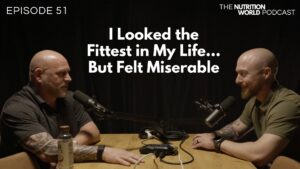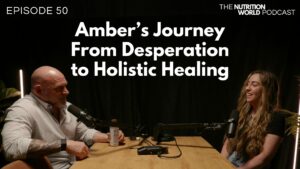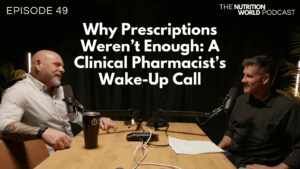How to optimize hormones for your relationships.
It’s no secret that our hormone levels decline as we age. As we all know, hormones play a vital role in various bodily functions, but their impact on our emotional and relational dynamics is equally significant. While hormones may seem like elusive biochemical entities, their impact on our relationships is undeniable.
By acknowledging and addressing the influence of hormone levels, we can cultivate healthier, more resilient connections with our partners. In this week’s episode, we do just that. Ed sits down with Josh Porter, PA-C, hormone specialist, and practitioner for Optimize U Chattanooga.
Learn more about Optimize U Chattanooga.
CHECK OUT OUR PREVIOUS EPISODES
Josh Porter 0:07
Welcome Josh Porter to the nutrition world podcast. This month, we’re going to focus on something that many people may think about. They may not, which is relationships, and it’s connection to hormone. Yeah. So welcome to this podcast. Yeah. Thanks for having me on. All right, let’s talk about how does this really affect and help or hinder relationships? And I’m talking not just intimate. I’m talking about even just Social, I’m talking about friendships. How does hormones affect that? What can we do about it? Yeah, so, man, thank you. And I’ve got, I could go so many different ways after just hearing your discussion there. I mean, one thing that I think about is vitality, I use that word a lot in my patients, because it when hormones start to decline, we lose that vitality of our lives. And that’s male and female, just that desire. And then you you brought up healthspan and lifespan. And, you know, I think one of the things that we have really missed in traditional medicine that you’ve kind of spent 45 years focused on is that is really like, how do we live a quality life? Right? How do we focus on that? healthspan? And that’s really what hormone optimization does, is as we age, Yes, Mother Nature has a way of going about my joke is, well, most 52 year old females don’t want to be pregnant. Right? Most guys are not looking to be a dad at age 55 or 60. And so there’s there’s declines that happen that are helpful to us. But there are also consequences to those declines. And so are there things out there? Where it’s like, yeah, I understand why we don’t produce hormones at a certain rate that we did when we were younger. But there’s also those consequences. And is there a place for hormone optimization hormone balance in the aging person? And you know, I think, to your point, and I mean, yes, relationships, you know, especially long term relationships, you know, you’ve got the ability, oftentimes, when you’ve got these, these short, you know, venture relationships, where there’s excitement, and there’s like that honeymoon effect, and, you know, you could be 65 years old and still have kind of, you know, blazing emotions about somebody, when it’s a new relationship. When it’s a longer relationship, sometimes to your point, it’s like, man, things change, you hear a lot of people who struggle in relationships, if they’ve been in a relationship for years, that often centers around hormone decline, right? I don’t know that. And they don’t know that, that they, that they, I see so many people who come in from a therapist, where they went there, which is great. And the first thing that therapists will say is, have you had your hormones check, because there may be something chemical that’s causing this problem where you don’t feel close to your husband, or you, you have a short fuse with your wife or your you don’t find yourself wanting to have intercourse with your spouse, or you, you know, you struggle with, you know, vaginal dryness as a female, and that causes you not to want to have intercourse. And so there’s so many different things where you could see where this tension happens. And and we don’t really have a great answer for it in traditional settings, because the idea of replace those hormones has just been, you know, kind of really looked down upon, they have looked down upon. And the thing is that thing, you know, and we all know that. Most times when you had that conversation with a health practitioner, if they had the ability to write a prescription, you’d be walking out with an antidepressant or anti anxiety, which is not the fix. Now, the first thing I noticed popping in, especially women’s heads, is it’s just too risky. I know that it can increase cancer and all this. And there was something I really thought of 20 plus years ago is I watched myself getting older and I watched so many people and I connect the dots. So what did they do to help themselves or what did they do to destroy their life, the quality of life?
Ed Jones 3:57
And people will ask me, you know, is Fischel risky? Is coke utan risky? Is this. To me? As far as that question, we have to say, here’s the level of risk. To me, one of the biggest risk factors is doing nothing by the age of 45. Yeah, it just is because this is what’s going to happen in most cases, your bone mass or muscle mass, your hormone levels, all of that will go into a plan of father nature, which is very cruel to us, right? Because Father nature wants us here for one reason to have babies so we can keep going. It doesn’t care that we live to be 80 it doesn’t care that you want to ride a bicycle and 65 years old. So we have to take upon ourselves to create this plan and doing nothing or having hope is your only plan is not going to work in most cases. So what are we talking about risk with hormones and how do people take the next step? Yeah, well, I think you know, that’s it’s a
Josh Porter 4:56
conversation we could probably spend an hour on just in risk versus being
Fitz, and I’ll try not to get lost in the weeds. But in general, the, the wrist that most people are told when it comes to for females, it’s the risk of breast cancer is the risk of cardiovascular events. It’s just not well grounded in, in the literature. You know, it’s more mythical, to be honest with you. Yeah, there’s maybe a few little things here. That’s kind of like, okay, you know, and you also got to remember, in medicine, nothing is absolute, right, you’re never going to get something where it’s 100% of the time, this is yet the outcome. So you have to use a breadth of knowledge. And you’ve got to use common sense. And I think we lose that in medicine, oftentimes, where we, you know, hey, this is what this data said. And so we draw a line in the sand and that’s it. But it’s, you know, overall, I’d say it one simple message is, hormones do not increase breast cancer when used appropriately. hormones do not increase cardiovascular events when used appropriately at the right time for the right patient. Yes, there’s outliers to that with with men, testosterone hormones do not increase prostate cancer, when used appropriately, does not increase cardiovascular events when used appropriately. So. And then you think factor in and I tell people this all the time, even if I took some of the risk. Okay, so like, if there are some controversial studies out there that says, oh, maybe there’s a slight risk of breast cancer? Well, here’s the here’s a risk of doing nothing. Look at cardiovascular disease, a third of us will die from cardiovascular disease, well, guess what is an increased risk of that not having yesterday while so
all forms of cancer combined come nowhere close nowhere close to the cause of death through cardiovascular disease. So, to me, there’s an easy risk versus benefit that I’ll just take it right away. But again, it comes back to that quality of life, it comes back to somebody who understands philosophically, they’re always going to be a learner, I am 100% always going to tell my patients, you need to read this, you need to listen to this. You can disagree with me, I’m totally fine with somebody having a different opinion about this, as long as they’re not ignorant. And and I don’t think and I think we don’t give patients enough credit. You know, we I don’t think people make decisions because they’re stupid. I think they make decisions because they’re ignorant. And they don’t do the research. Right. And so what is what can we do as medical providers as healthcare, you know, as health and nutritional providers, we can empower, we can educate, we can give people resources, hey, read this book, ask me questions about it. Listen to this. And again, I tell I truly believe this. If somebody reads some of the things that I give them, or listen to this and has a different opinion, I will I will support them. And I will say, You know what, this is probably not the right thing for you. But I don’t want them to make that decision naively to say, Well, I’m not going to do it, because it scares me. Bingo, why does it scare you use
Ed Jones 7:51
your magic word was appropriately, a lot of clinics are not doing it appropriately. Some are some aren’t that you’re not putting all the most physicians who don’t have a skill set, don’t understand it. So either they’re not doing anything, or they’re not really doing it appropriately. So that’s why I love you, as far as optimize you. You are the proprietor owner of optimize you and that your specialty is the best, healthiest, integrative, far reaching thought pattern of is this appropriate for person eight? If it is how do we do it as closely to safely as we can what you do? I’ve sent you several people who they came back and said, Well, Josh said, I’m not really a candidate. You don’t hear that very often we go to a specialty clinic. Most specialty clinics, everybody’s Yeah, that’s right. If you have like
Josh Porter 8:45
it’s a money thing, right. Credit card. That’s right. Yeah, yeah.
Ed Jones 8:48
So tell people and optimize you. What would be a stamp? And how could they contact you? Yeah. Does it work?
Josh Porter 8:54
Yeah. So I mean, our approach is very much connected to you guys through nutrition, where we want to have a holistic approach, right? I’m looking at lifestyle factors. I’m looking at supplementation, I’m looking at dietary changes exercise. As I meet with patients, I’m looking at restorative options that they can do sometimes supplements can do some that stuff. We’re going to look at lab values, for sure. That’s the first step is my patients will come in, they’ll get labs, then they’re going to sit down with us and we’re going to spend 45 minutes to an hour. And I like to think of that is again, it’s my educational moment with my patient, right. I don’t get that much time with patients most after that, right. It’s 15 interior 30 minutes here in those follow ups. But that first hour is my window to say let me let me start this process with you to educate you. So we create some think of it like a checklist. Why did you come see me? What were the symptoms? I don’t want to have sex with my husband. You know, I’m really emotional. I find myself depressed. I don’t sleep well at night. You know, for guys, I’m not motivated anymore. I don’t have that vigor. So we just start making these checklists and then we I like to put something on the board, I will bring their their levels their labs to life. And I’ll say, here’s what’s happening. Here’s the symptoms, start connecting the dots. Here’s where you what you do you bring these hormones in. And now here’s our checklist. Can we get rid of vaginal dryness? Can we get rid of hot flashes? Can we get rid of low libido, right. And as we do that, that’s where the balance comes in. Because then you can start, people feel better, right? I mean, that’s, that’s the ultimate goal here is to improve that quality of life. And so, you know, the easiest way to contact us, we’ve got two locations now here in Chattanooga, in large part thanks to you because of just the referrals and the network that we built through nutrition world, but we’re on the lower level, I refer to that one as the OG that’s that’s the that’s the original Chick fil A. It’s not going anywhere unless you kick me out. But I just so value that space because it really does represent who we are. But you can find us online at optimizing chattanooga.com. Again, we’re on the lower level nutrition world here. And then in Hickson we’re offered 153 Right across from crunch fitness in that area. You can call us which is 423-206-9753 There’s a lot of ways you can find us you probably get brochures at nutrition world just you know, reach out to
Ed Jones 11:15
us. It’s awesome. And what a great education for people who have either been wondering or, or want an option. Now the word balance and we’ll finish with this is like profound to me because health is so much about a balance not too much and not too little. That does come also from the knife and fork that is right make every single day. I do a lot of videos on how do we put together a plan of action with the right macros the right protein, fats and carbs. To me, that’s the most important thing for losing body fat and feeling better. And it can help the hormones modestly. Yeah, we have some things for men and women that helped modestly, modestly. So if a person is in the ditch, it’s not going to be enough. Sure, but still raising the vitamin D levels and decreasing inflammation and putting together a plan of better sleep at night. You You and I both know that it’s right. The devastation to hormones is tripled when you are having and we have options to help people with that in fact on nutrition w.com If you Google nutrition ws sleepy book, I’ve written an ebook that explains what I have learned through my own insomnia, right people Yeah, but thank you, Josh, for all you do the community. I never go probably more than two days without someone saying, Wow, my life is so much better from going to optimize you because you and your crew. Yeah, just you write stuff is is is passionate and honest to you. And those two things are the most important. So thank you for joining us on Nutritionals podcast today. Thank you.



